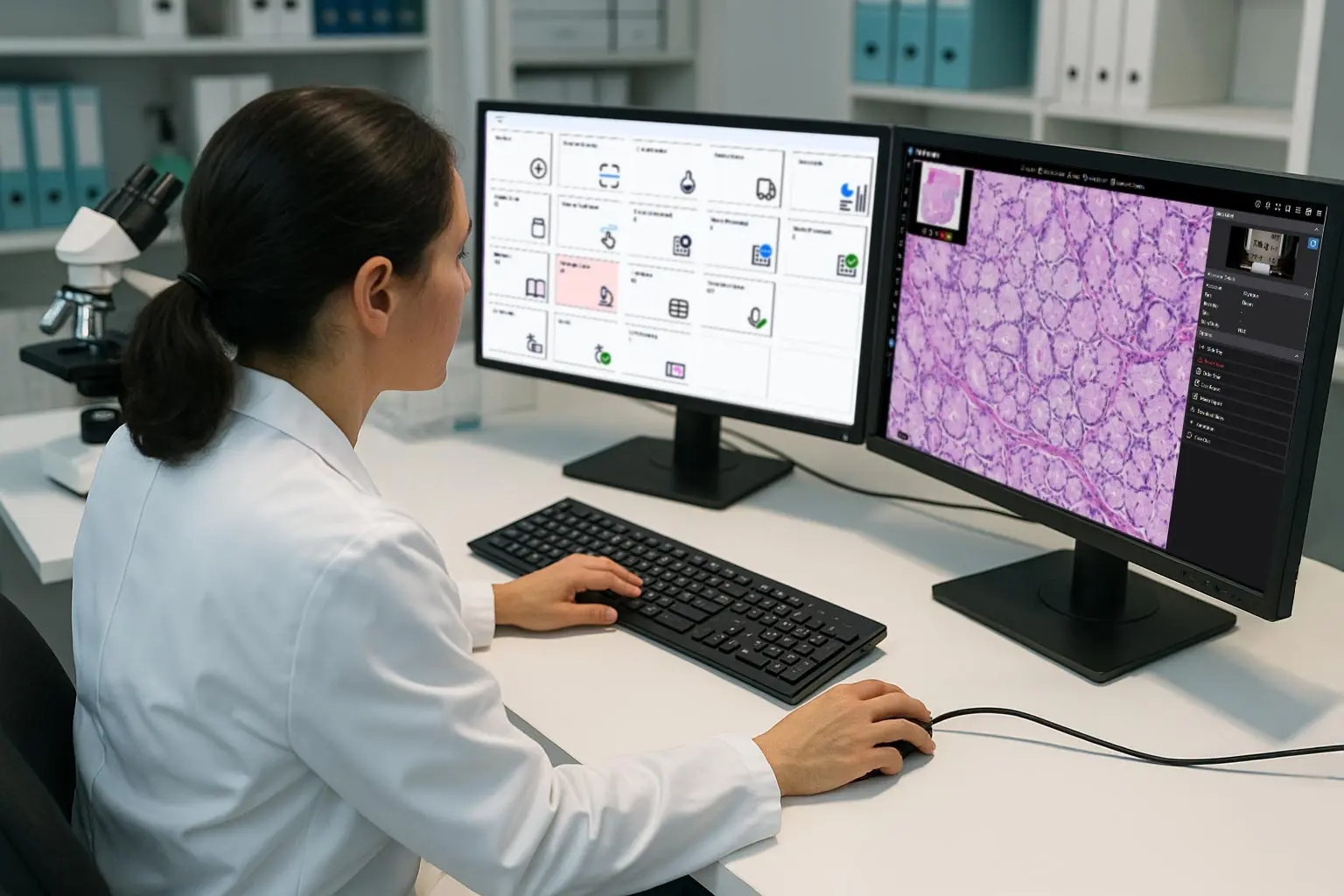Blog
Customizing LIS Systems for Specialized Laboratory Needs
August 1, 2025
In today's fast-paced healthcare environment, laboratory challenges are a constant presence.
Did you know that as much as 70 percent of medical decisions are based on laboratory test results? Due to the critical nature of their work, medical lab pathologists, directors, managers, and CEOs must be equipped with efficient laboratory information systems (LIS software solutions) to manage and interpret this essential data.
Customization of laboratory information systems, also known as lab information management systems (LIMS), is essential for meeting the specific needs of various lab professionals. Today’s advanced medical LIS software technology plays a critical role in enhancing both operational efficiency and patient care, streamlining workflows for pathologists while delivering strategic insights for lab managers and executives.
Discover More: The Best Laboratory Information System Companies and the Advantages They Offer to Their Laboratory Clients
Let’s explore the importance of LIS healthcare customization (for instance, molecular LIS software and anatomic pathology LIS systems may require completely different customization) for medical professionals, using a passive, non-first-person tone.
The goal is to provide valuable educational content to enhance understanding of this crucial aspect of pathology lab management. Let's enter the world of LIS system software customization and its impact on the daily operations of pathologists, directors, managers, and CEOs.
Case Study: OnePath - Transforming Pathology Lab Management Through Digital Innovation
Understanding the Need for Laboratory Information System Software Customization
Specialized laboratories, such as those focused on pathology, encounter distinct challenges that traditional pathology lab software solutions simply can't solve. These labs manage a high volume of diverse tests while maintaining strict standards for accuracy and efficiency, making it essential to deploy tailored medical laboratory information system software. Off-the-shelf LIS systems lack the customization needed to support the complex operations of pathology labs.
Customizing a lab information system is a critical component of an organization’s success. That’s because configurable LIS software supports purpose-built workflows to optimize performance and ensure precise results. For LIS pathology platforms in particular, customization directly contributes to greater efficiency, accuracy, and overall lab success.
For pathologists, lab directors, managers, and CEOs, understanding the need for customization in their laboratory operations is essential. By investing in customized LIS systems backed by innovative laboratory information system vendors, these professionals can better address the unique challenges faced by their specialized laboratories and ultimately improve efficiency and accuracy in their operations.
On-Demand Webinar: Leverage LIS System Rules, Automation, and Data Analytics to Increase Efficiency and Cut Costs

Tailoring Laboratory Information Systems for Pathologists
Laboratory information systems (specifically anatomic pathology LIS solutions) play a crucial role in streamlining the lab workflow of pathologists, who are responsible for analyzing and interpreting patient samples.
Customization options for anatomical pathology software can greatly benefit pathologists by addressing their specific needs, such as:
- Integration with digital pathology solutions and digital pathology workflow to enable viewing and analyzing of digital slides.
- Customizable LIS software templates to streamline the creation of pathology reports.
- Specialized modules for anatomic pathology LIS workflow tailored to the specific requirements of pathologists.
By leveraging customized features and modules from an advanced LIS model, pathologists can enhance their diagnostic capabilities and overall efficiency, ultimately improving patient care and outcomes.
Discover More: Pathology Lab Reporting Software: Enhancing Laboratory Efficiency
Meeting Laboratory Information System Requirements
Lab directors and managers face a range of expectations and challenges in their roles, including ensuring an efficient pathology lab management system, maintaining compliance with regulations, and optimizing resources.
Additionally, they must navigate the complex task of overseeing a diverse team of professionals, managing equipment and supplies, and meeting the needs of all stakeholders within the laboratory setting.
To streamline these management tasks, lab directors and managers can benefit from customizable LIS systems tailored to their specific operational needs.
Customization solutions provided by laboratory information system companies can include personalized workflow management, integrated quality control measures, and customizable reporting features. These tailored LIS software solutions enable lab directors and managers to more effectively oversee day-to-day operations and proactively address any challenges that may arise.
Studies have shown that the best pathology lab report software is a customized medical LIS system, as it greatly enhances resource allocation and drives cost-efficiency across laboratory operations.
Industry Insights: Empowering Laboratories - The Benefits of Full Agency Over LIS System Configuration
Real-World Results: How ECPC Boosted Productivity and Collections with a Customized LIS System
Supporting this point is a compelling case study from LigoLab, which details the experience of Eastern Connecticut Pathology Consultants (ECPC). Their implementation of LigoLab's all-in-one medical LIS and laboratory billing (lab revenue cycle management) informatics platform led to a tripling in productivity and a 35 percent increase in net collections.
This real-world example, detailed in ECPC's success story, vividly illustrates how a customized LIS lab can meet specific laboratory needs and significantly improve operational efficiency and financial performance.
Addressing the Pathology Lab Management Concerns of CEOs
Lab CEOs navigate strategic challenges in managing their clinical laboratories and pathology groups, focusing on enhancing efficiency, complying with regulations, and fostering growth. Implementing a customized pathology lab management system is pivotal in addressing these challenges while aligning with their objectives.
Evidence from linked sources underscores the considerable return on investment (ROI) and lasting advantages of employing tailored pathology LIS systems. For instance, research indicates that a medical LIS hospital deployment brings notable cost reductions and revenue increases over extended periods.
Such findings bolster the argument that customized LIS systems engineered by modern LIS software vendors can significantly improve a lab's financial health.
Real-world cases further illustrate the positive impact of customized LIS systems and modern laboratory information system companies have on CEO strategies.
A notable example is the Avero Diagnostics success story, where implementation of LigoLab's medical LIS and lab RCM platform led to enhanced productivity, reduced turnaround times, and operational savings. This case study exemplifies how an all-in-one and highly configurable LIS software can meet the strategic needs of lab CEOs and produce measurable outcomes.
A customized LIS laboratory information system offers a strategic solution for CEOs, ensuring significant ROI, long-term benefits, and a profound effect on laboratory operations.
Learn More: Leveraging LigoLab for Optimal Return on Investment: An LIS System Guide for Lab Leaders

Best Practices for Implementing a Customized Laboratory Information System
When customizing your lab’s medical LIS software, it's important to follow best practices to ensure a seamless and efficient implementation process. Here's a step-by-step guide on approaching customization for pathologists, directors, managers, and CEOs:
- Define Your Lab’s Unique Needs: Collaborate with your team and your LIS system provider to pinpoint the specific requirements of your laboratory. These may include customized workflows, tailored report formats, or seamless integration with other laboratory software systems.
- Assess Customization Capabilities: Develop a comprehensive checklist to evaluate the customization options offered by leading LIS software vendors. Key factors to consider include industry expertise, compliance with regulatory standards, and a proven history of successful implementations.
- Define Scope and Timeline: Clearly define the scope of LIS system customization and establish a realistic timeline for implementation. This will help manage expectations and ensure all stakeholders are aligned.
- Test and Validate: Before finalizing the LIS system customization, conduct thorough testing and validation to ensure the chosen LIS system meets the desired objectives and the laboratory information system functions correctly.
- Provide Training and Support: Once lab information system customization is complete, provide comprehensive training to all LIS software users and offer ongoing LIS pathology support to address any issues or concerns.
Real-world case studies or examples of successful LIS system customization projects can provide valuable insights and serve as best practice examples.
By following these best practices, you can ensure a successful and tailored implementation that meets the unique needs of your laboratory.
White Paper: Best Practices Guide - Managing LIS System Timelines for Vendor Research and Implementation
Ensuring Laboratory Information System Data Security and Compliance
Data security in specialized labs is of utmost importance to meet compliance requirements and ensure the confidentiality and integrity of patient information. Customizing laboratory information systems to suit the specific needs of a lab is crucial in achieving these goals.
Relevant regulations and guidelines, such as the Health Insurance Portability and Accountability Act (HIPAA) and the Clinical Laboratory Improvement Amendments (CLIA), outline the specific requirements for data security in medical laboratories.
By customizing LIS system software to adhere to these regulations, labs can ensure compliance and mitigate the risk of security breaches.
Essential security measures to consider when customizing pathology LIS systems for data security and compliance include:
- Role-based access control to limit access to sensitive information
- Encryption of data at rest and in transit
- Regular security assessments and audits
- Secure user authentication methods
By implementing these measures, labs can enhance their laboratory information system data security and ensure compliance with relevant regulations and guidelines.
Discover More: LigoLab’s Enhanced Cybersecurity Solutions Give Customers Added Protection and Peace-of-Mind
Future Trends in LIS Systems and Customization
As laboratory technology advances, pathologists, directors, managers, and CEOs must anticipate future trends and the potential evolution of laboratory information system software customization to meet their needs.
One emerging trend in laboratory technology is the increasing demand for customized medical laboratory information system solutions.
With the growing complexity of laboratory processes and lab workflow, there is a need for custom-built LIS systems that can efficiently manage and streamline lab operations. This customization supports tailored LIS software solutions to meet the specific needs of each laboratory, improving efficiency and accuracy.
Industry experts predict that in the future, customization will play an even more significant role in medical LIS systems. Customized LIS software will be designed to seamlessly integrate with other laboratory software technologies, such as automated instruments and robotics, creating a more cohesive and efficient laboratory environment.
According to a report by Grand View Research, the global laboratory information systems market is projected to reach $3.5 billion by 2030, driven by the need for advanced LIS software solutions. This data supports the notion that customization in LIS systems will continue to grow in importance to meet the specific needs of laboratory professionals.
The future of LIS lab customization looks promising with tailored pathology software solutions that integrate seamlessly with emerging laboratory technologies in high demand. By anticipating and embracing these trends, laboratory professionals can ensure that their facilities remain at the forefront of technological advancement.
Discover More: What to Look Out for and Avoid When Shopping for a New LIS System

Key Takeaways:
- Customizing laboratory information systems leads to improved efficiency and accuracy in LIS lab operations.
- Tailoring LIS systems to specific needs can streamline lab workflow and enhance data management and analysis.
- With optimized LIS software, pathologists, directors, managers, and CEOs can better meet regulatory requirements and improve patient care.
Unlocking the Future Potential of Laboratory Information System Customization
Laboratory information system software customization holds immense potential for improving efficiency, accuracy, and overall performance in the lab setting. By laboratory information system companies tailoring their LIS software solutions to specific laboratory needs and workflow, pathologists, directors, managers, and CEOs can unlock the following benefits:
- Enhanced Workflow Efficiency: Customizing the LIS system enables seamless integration with existing laboratory processes, eliminating bottlenecks and optimizing workflow efficiency.
- Improved Data Accuracy: Tailoring the LIS medical system to align with specific testing requirements and result reporting standards can significantly enhance the accuracy and reliability of laboratory data.
- Streamlined User Experience: Customization of laboratory information systems allows for a user-friendly interface and optimized LIS staffing, ultimately enhancing productivity and reducing the likelihood of errors.
- Compliance Adherence: Customized LIS systems can ensure adherence to industry-specific regulations and standards, helping labs maintain compliance and avoid costly penalties.
- Data Analytics Capabilities: The best LIS software can be customized to provide tailored data analytics and reporting functionalities, offering valuable insights for informed decision-making and quality improvement.
Discover More: Understanding the Importance of Real-Time Analytics in the Modern Clinical Laboratory
Labs can unlock the future of efficient and high-performing laboratory operations by harnessing the potential of LIS system customization.
Experience the Power of an advanced and highly configurable LIS system—Schedule Your LigoLab Demo Today!
.jpg)






